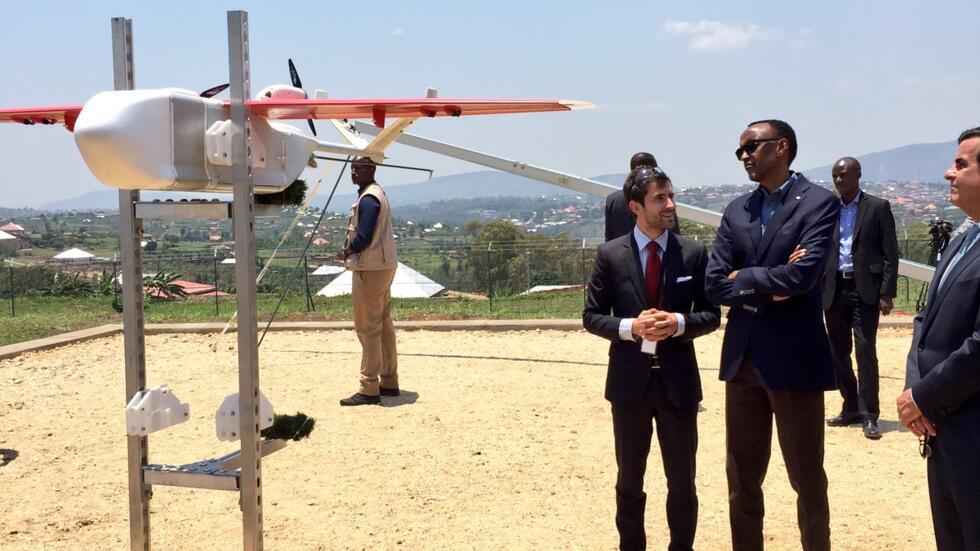The world is watching Rwanda's medical drone program
Rwanda launched a program Friday that will use drones to deliver blood to hospitals in rural, hard-to-access parts of the country in what has been hailed as the first commercial drone delivery service in the world.
Issued on: Modified:

Rwandan president Paul Kagame had the honor of launching the inaugural medical delivery drone on Friday in Muhanga District. A crowd of Rwandan authorities and their North American and European partners in the project as well as eager spectators gathered for the event.
Kagame counted down from three and then sent the drone sailing into the blue sky using a large, stationary catapult.
The drone looked like a small, round toy aeroplane and Kagame could have been testing a particularly fun toy.
However, these drones will be sent on life-saving missions. Designed by an American company called Zipline, the drones-- nicknamed ‘zips’--will deliver blood, plasma and other life saving supplies to hospitals in rural Rwanda.
It’s considered the world’s first commercial delivery service using drones.
“We feel extremely proud because Rwanda is becoming a model for other countries,” said Malick Kayumba, the head of Rwanda’s Health Communication Centre, which works with the Health Ministry.
Indeed, the Rwanda government was the main impetus behind the project, said Moz Siddiqui, who is a manager of global operational partnerships at Gavi, the Vaccine Alliance. They teamed up with the Rwandan government and Zipline to get the drone service going.
“The Rwandan government has a very comprehensive vision as to how to use drones both now and in the future,” Siddiqui said. “They have a strong ministry of health who are very forward-looking.”
Rwanda is known as the land of a thousand hills. During flooding season, it is especially hard to access more rural regions.
“If you have a child who’s been bitten by a rabid dog or a mother dying of postpartum hemorrhage, time is of the essence,” Siddiqui said. “The Zipline project takes the time of delivery from hours to minutes.”
Gavi, the Vaccine Alliance are looking for ways to take what Rwanda is doing and apply it to other health needs. Other people in the industry are also watching.
“It’s difficult to make drones who do what we need them to do safely,” said Denise Soesilo, who works with The Swiss Foundation for Mine Action. She’s managing a project that looks at how drones could be used for humanitarian use.
“You also have to work around regulations and politics aside from the technology aspect. So the fact that they managed to launch an operational project is incredible.”
Each drone can fly 60 kilometres from where it's launched. But Soesilo says that one of the most innovative features is that the drone doesn’t actually land. It just drops the item, which is equipped with a parachute.
Then the drone turns around and flies 60 kilometres back to its base. “They don’t have to worry about having a landing strip or trained personnel at the other end,” Soesilo said.
Zipline say they plan to start making 50 to 150 deliveries a day immediately.
Daily newsletterReceive essential international news every morning
Subscribe